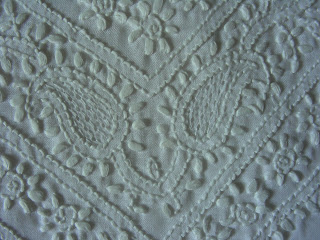 travelling in the near future, everybody whom we knew asked us to buy chikan wear for them. Since the "orders" were large in number, we went to the wholesale market of chikan wear to purchase the stuff. Since most of the stuff to be bought was ladies' wear, I was trying to kill time in the city of Nawabs. So, I struck a conversation with the shopkeeper and tried to extract some history about the chikan work. This is an account of what he told me.
travelling in the near future, everybody whom we knew asked us to buy chikan wear for them. Since the "orders" were large in number, we went to the wholesale market of chikan wear to purchase the stuff. Since most of the stuff to be bought was ladies' wear, I was trying to kill time in the city of Nawabs. So, I struck a conversation with the shopkeeper and tried to extract some history about the chikan work. This is an account of what he told me. The art of chikan work was born out of the Nawabs' and their kins' desire to wear clothes that had exquisite designs in the form of embroidery. The First war of Independence in 1857 saw the end of the Nawabs of Lucknow. But the legacy of chikan embroidery left behind by them still lives on and is strongly thriving. And this is perhaps one of those industries which truly works on the idea of "gramudyog" or employment at village level. All the embroidery is done by hand and there is no automation involved. Automated equipment is probably not possible for such intricate designs.
This is how the making of a chikan apparel works. The cloth for the apparel comes into Lucknow from various cloth mills across India. The wholesaler who purchases the cloth is the one who sells the end product. A design of the embroidery is etched upon the cloth according to its end use (say ladies' wear or gents' wear). The pieces of cloth are then distributed, by an agent, to women in various villages in a radius of 100 km from Lucknow. All these women who do the embroidery, work from their homes. Each woman is given a fixed number of pieces of cloth for embroidering. The work of embroidery goes on for around four months. All this embroidery is carried out by the women in the premises of their homes, using their hands to sew the intricate patterns. After the embroidery is over, the agent comes and collects the clothes from the women. The agent has a fixed frequency of touring the villages to collect all the clothes. The wages depend on the amount of embroidery work that goes onto the cloth. The more the embroidery, the more is the wage paid to the woman doing it. These wages are paid when the clothes are collected by the agent. The agent then brings back all the clothes to the wholesaler, who then gets them washed by washermen before putting them out for sale. In the entire process, only manufacturing of the cloth is mechanised. In the remaining process it is the humans who rule the roost.

This comment has been removed by the author.
ReplyDeleteIt has very nice information with nice articles of chikan.Lucknow is famous for chikan.Here you can find every type of chikan suit and sarees.we have a good collection of chinkankari suits.Thanks for sharing.
ReplyDeleteChikankari Kurtis
Nice and informative blog! Lucknow is famous for chikan embroidery all over the world. Thanks for sharing this blog.
ReplyDeleteBuy Online Chikankari | Chikankari Products in India
Nice ideas about chikankari saree and material. thank you for posting blog.
ReplyDeleteNice Designs.
ReplyDeleteFlat 40% off On Fabulous Range of Online Mangalsutras at IndiaRush
Looking for your soul mate!! Nescomatrimony, the Best Naidu (naicker, Balija naidu matrimony, Tamilnadu kamma, Gavara Naidu Bridegroom, Balija Bridegrooms) brides and grooms. we are Tamil naidu matrimony Services offers thousands of naidu brides and bride groom profiles to find your perfect match. Register FREE!
ReplyDeletekamma matrimony
This comment has been removed by the author.
ReplyDelete